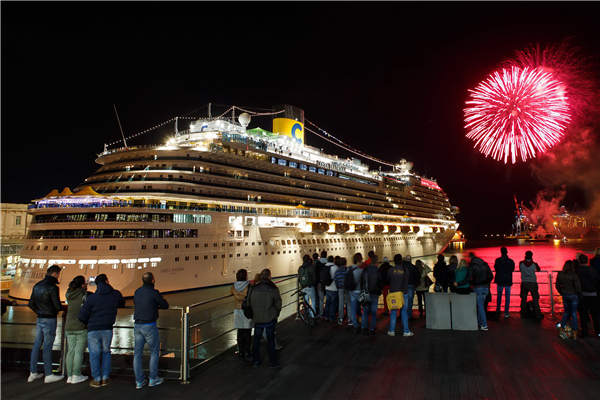
Tourists enjoy various kinds of facilities on board Costa cruises. Photos provided to China Daily
The global cruise company Carnival Corporation & plc, expects to jointly launch a domestically owned cruise brand in the Chinese market, in cooperation with Chinese corporations.
The brand is expected to be operating in the market sometime in 2018. Pending market research will determine where that joint venture will be positioned in the marketplace, according to Arnold W. Donald, the group's president and CEO.
During President Xi Jinping's visit to Britain in October, the Carnival group signed a joint-venture agreement with China State Shipbuilding Corporation and China Investment Corporation.
"The cruise brand will focus on Chinese citizens, but we can't define what style that brand will be, such as luxury or contemporary, until the research is finished," says Donald, who recently visited China for more discussion with the Chinese partners. The group already runs popular cruise brands in China such as Costa and Princess.
China National Tourism Administration data shows 120 million Chinese traveled overseas in 2015. According to the China Cruise and Yacht Industry Association, more than 1.11 million Chinese travelers took a cruise overseas in 2015, an increase of 50 percent over 2014. More than 120,000 foreigners visited China on a cruise, up 4.7 percent over 2014.
"China has the potential to be the largest cruise market in the world. Plenty of Chinese outbound travelers haven't yet chosen to cruise, and they will love it eventually," he says.
"It's essential to find ways to accommodate the unique needs of Chinese guests while maintaining the integrity of cruise brands," he says. Special features aimed at Chinese travelers could include public space for group tai chi, private settings for table games such as mahjong, and opportunities for luxury shopping.
"A personalized travel experience is an overall trend in cruising. Cruising is a hospitality business. Our crew is trained to interact with the guests according to what they want," he says.
"Just like you have your own customized apps on your mobile. Travel is that way too. The better we are able to deliver that individual experience, the more successful we will be."
Individuals have different preferences such as music and food, he says. It's vital to make sure Chinese guests are on the right ship and that staff members communicate effectively with the guests throughout the trip.
He says the new brand will be differentiated from others: With so many outbound tourists, there is the opportunity to have various brands that resonate.
"It's important to have domestic entities working with us, and we will build a sustainable cruise industry together. One of the wonderful differences about partnering with Chinese companies is that they truly take a long-term view," Donald says.
Zheng Weihang, executive vice-president of the China Cruise and Yacht Industry Association, says it's a win-win situation because they all bring their own expertise and experiences to the table.
According to him, the domestic cruise industry is developing quickly, and more private and State-owned corporations will join in.
"Cruise is a capital and technology intense industry. The challenges are to have proper operations and train cruise talents."
Zheng also emphasizes the importance of attracting more inbound cruise tourists to China. He suggests Asian countries cooperate with each other to promote their cruises together in Western countries.
According to an online survey by China's iResearch Consulting Group in July 2015, 45.9 percent of the Chinese tourists on outbound cruises preferred onshore experiences in the daytime and a rest on board at night; 25.6 percent hoped to spend about one day onshore; and 11.9 percent wanted to stay on board all time.


















































